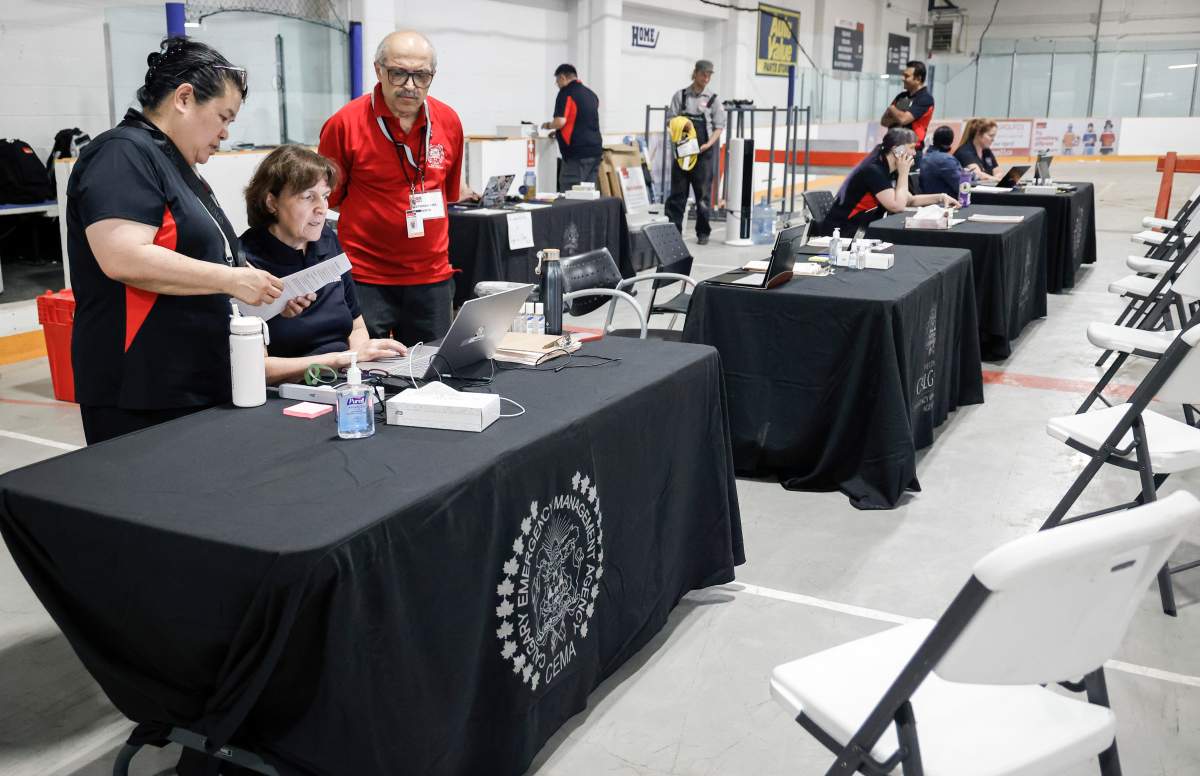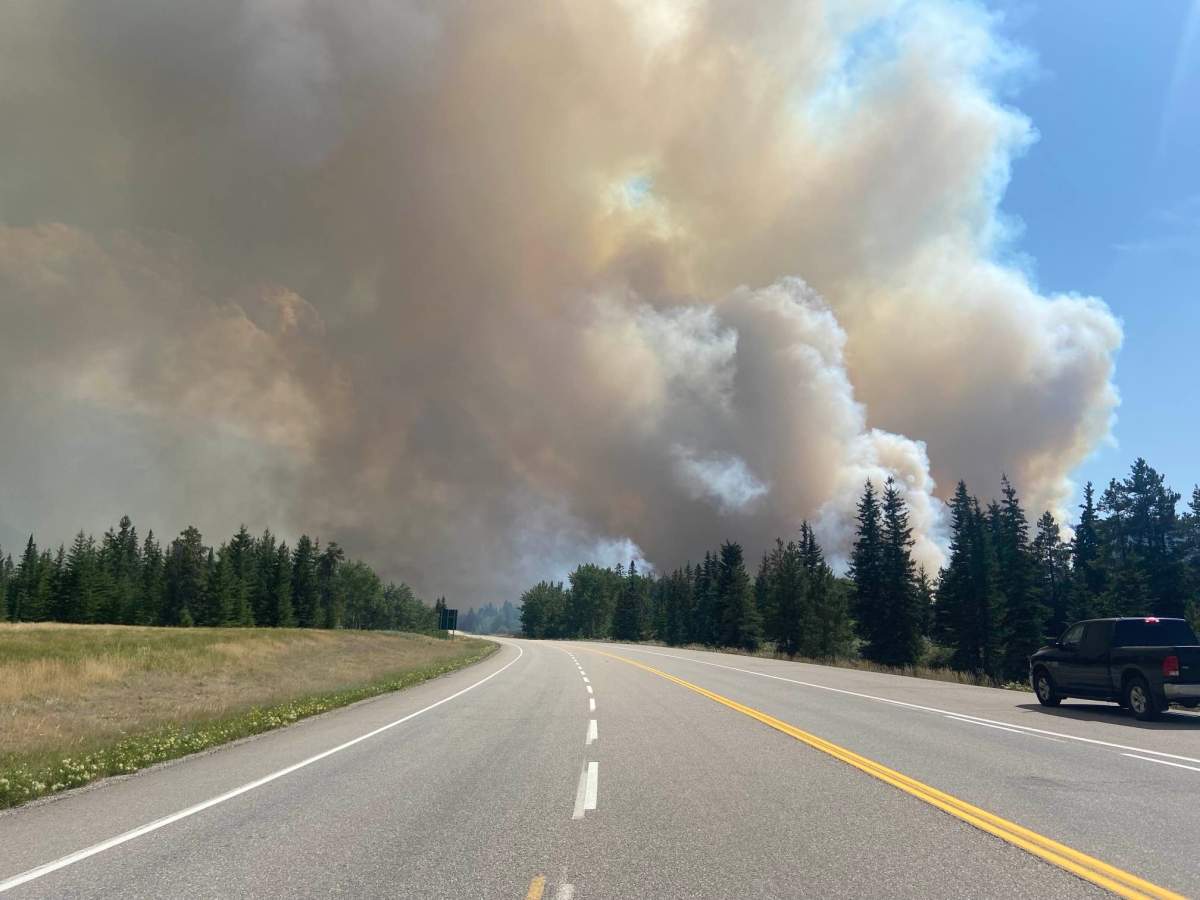The townsite of Jasper had been evacuated as of Tuesday evening, but Parks Canada said staff were still working to get backcountry campers out who may not yet be aware of Monday night’s evacuation order that was triggered by threatening wildfires.

In all, officials believe about 25,000 people were impacted by the evacuation order issued for all of Jasper National Park in western Alberta. Because of where the wildfire hazards are, evacuees were forced to head west as they left the mountainous park, and then to essentially take long and wide U-turns to reach safety at reception centres set up in Calgary, Edmonton and Grande Prairie.
The wildfire threat forced people to flee the popular national park in western at the peak of summer tourist season when many hotels and campgrounds were full.
As of Tuesday evening, there were two main fires of concern in Jasper.
Parks Canada said the “north wildfire” was located between the Jasper transfer station and the Jasper air strip, on both sides of Highway 16. It was estimated to be 270 hectares.
The “south wildfire” was further from the townsite down the Icefields Parkway. Parks Canada said the estimated 6,750-hectare fire stretches from near Kerkeslin Campground in the south and follows Highway 93 north to near Horseshoe Lake. The wildfire crosses the highway a few kilometres south of Wabasso Campground.
“It’s wall-to-wall traffic,” said Carolyn Campbell, of Edmonton, in a phone interview with The Canadian Press from her vehicle early Tuesday morning.
“(The smoke) is pretty thick. We’ve got masks in the car.”
Evacuees were told they could go about 120 kilometres west to Valemount, B.C., but officials said that community of 1,000 people has little ability to offer additional services to evacuees and would not have a reception centre, though a welcome centre had been set up there for much of the day. That centre has since been closed.
For evacuees needing a place to sleep, they were forced to take a long detour to reception centres in Alberta.

At a news conference held via video call on Tuesday, Alberta emergency officials were asked why evacuees were not being directed to somewhere like Prince George, B.C.
Stephen Lacroix, the managing director of the Alberta Emergency Management Agency, suggested communities in British Columbia currently have little ability to house evacuees.
“The issue is the severity of wildfire activity and evacuations in B.C. proper,” Lacroix said.

Get daily National news
“They had no capacity to house Albertans.”
Lacroix told reporters there were no reports of any injuries resulting from the evacuation effort as of 10 a.m. He also said there were no reports of any structures being lost.
“(It’s) pretty impressive actually,” he said.
Alberta Public Safety Minister Mike Ellis also spoke at the news conference. He suggested evacuees to take long detours, either through Prince George, B.C., proceeding north and east to Grande Prairie, or south to Kamloops before going east to Calgary.
Ellis noted the local hospital has been emptied as well, with patients sent to Hinton.

Officials issued the evacuation order at about 10 p.m. local time on Monday amid a provincewide heat wave and as parts of Alberta were experiencing windy conditions.
People were told they needed to be out of the park by 3 a.m. local time and a local state of emergency was declared.
Evacuees described scenes of long lines of vehicles moving slowly west through the mountains with evidence of wildfires all around them.
Richard Ireland, the mayor of the Municipality of Jasper, spoke to Global News on Monday night as the evacuation process was unfolding.
“Wildfire is an unfolding event, things can change rapidly,” he said. “We take the best information that we can get from those on the front lines, and of course we want to prevent any sense of alarm or panic.”
In a Facebook post shortly before 3 a.m., Jasper Park officials said “multiple wildfires” in the park have created an “evolving situation.”
“We will provide information on backcountry areas when it is available, and will work to ensure that those in the backcountry can leave, or are evacuated, safely.
“If you have a way of contacting those in the backcountry, they should remain in place, at a designated campsite if possible.”
Sebastien Delorme, who works in the national park, told Global News there has been more fire activity in Jasper recently.
“We actually had one at our workplace about three days ago that they put out in about 20 minutes, so fires are not an un-normal thing in Jasper,” he said. “But to see it come through with an actual evacuation order is definitely a little bit intense.
“We do know that there’s a very high fire risk in Jasper, so we were kind of expecting it. But of course, when you actually hear an evacuation, it’s definitely a bit of a shock.”
Jasper National Park is the largest national park in the Canadian Rockies, home to campgrounds, scenic rivers and lakes, and extensive trail networks.
Alberta Forestry Minister Todd Loewen and Alberta Wildfire spokesperson Christie Tucker also spoke at the same news conference as Ellis and Lacroix on Tuesday.
Loewen noted that Alberta “continues to experience hot and dry weather” and that the weather forecast for next week calls for more of the same.
He said there are currently 170 active wildfires burning in the province and over 50 are out of control. Since Jan. 1, Alberta has seen over 930 wildfires in forest protection areas and over 440 of those were this month alone.
“The past few weeks have been tough.”

Loewen told people fleeing Jasper that his government is “here for you” and extended gratitude for firefighters coming to Alberta from other jurisdictions to help with the situation.
The wildfire danger is extreme in most areas of the province.
“Today we are expecting a change in that fire behaviour,” Tucker said Tuesday. “We’re preparing for challenging conditions.
“We are anticipating what could be an active day.”
Tucker said her department has already provided support to firefighting efforts in Jasper with aircraft, personnel and intelligence.
Ellis described the current situation in Jasper and elsewhere in the province as “a challenging time” but added he was heartened at how well local officials, the province and Parks Canada have been able to collaborate on a response to the wildfire threat and the evacuation effort.
When asked about officials in other cities arranging to accept wildfire evacuees from Jasper, Ellis said such a response is one he sees as “typical of Albertans.”
“(Albertans) step up to the plate to support people,” he said. “(These are) examples of what it means to be an Albertan.”
“Outstanding co-operation all around is what I would say,” Lacroix added.
On Tuesday afternoon, there was more evidence of how perilous the wildfire situation continued to be in Jasper National Park. An afternoon media tour that aimed to give news reporters a closer look at the flames had to be cut short because the danger was too great.
The RCMP took a convoy of journalists from the Jasper park gates near Hinton on Highway 16 towards the townsite which had already been evacuated.
However, the tour had to stop about 12 minutes out from Jasper, because the flames from one of the fires were raging too close to the road.

For the latest information on which areas in Alberta are under an evacuation alert or order due to a wildfire, visit the Alberta Emergency Alert website.
For the latest information on the wildfire status and danger across the province, visit the Alberta Wildfire website.
The latest information on fire advisories, restrictions and bans across the province can be found on the Alberta fire bans website.
For the latest on road closures in Alberta, you can visit the 511 Alberta website.
— With files from Global News’ Phil Heidenreich and The Canadian Press’ Lisa Johnson











Comments
Want to discuss? Please read our Commenting Policy first.